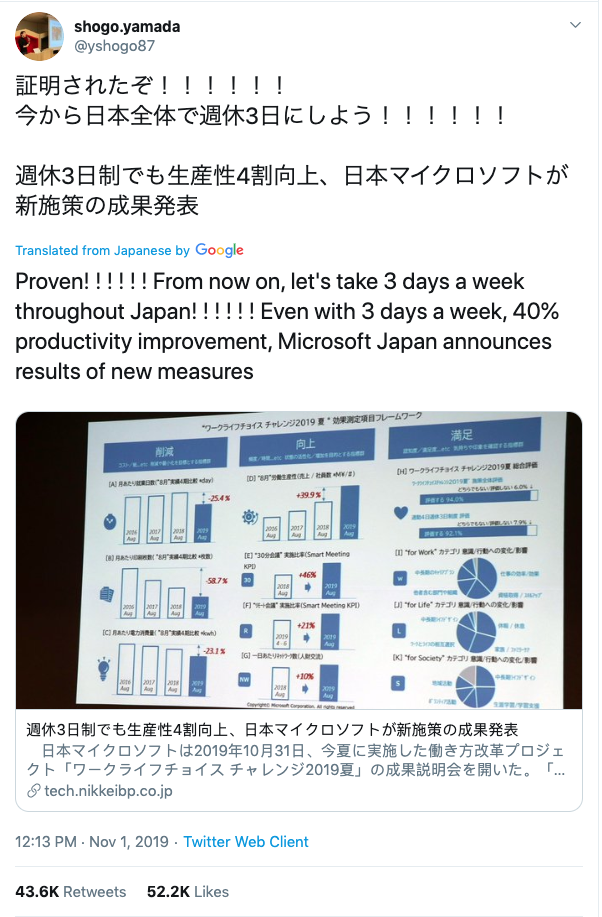What happened when Microsoft gave workers a 3-day weekend

Productivity at Microsoft Japan increased by nearly 40 per cent when staff were given Fridays off, the tech company has revealed.
Related story: Toxic workplace habits leading to burnout
Related story: Calls for a new public holiday to de-stigmatise mental health sick leave
Related story: Quitting this workplace habit will make you finish tasks 40% faster
The company carried out a ‘Working Reform project’ in August, giving 2,300 employees every Friday off for one month without impacting annual or sick leave, according to Sora News.
And the results were clear: productivity went up 39.9 per cent, mainly due to more efficient meetings.
Many were shortened, cut or made virtual. Staff also took 25.4 per cent fewer days off over that month.

It comes just months after Japan introduced a new law capping overtime, limiting legal overtime work to 45 hours a month with fines of up to 300,000 yen for companies that break the rules.
But Microsoft Japan is not the first country to innovate in this area.
Australian company Versa introduced a no-work Wednesday policy in 2018, and saw revenue soar nearly 50 per cent, while profits almost tripled.
A four day week is good for the planet and the soul

University of Pennsylvania psychology professor Adam Grant said three-day weekends would likely have huge benefits for worker wellbeing.
“I think we have some good experiments showing that if you reduce work hours, people are able to focus their attention more effectively, they end up producing just as much – often with higher quality and creativity,” he said at the World Economic Forum’s meeting in Davos earlier this year.
“And they’re also more loyal to the organisations that are willing to give them the flexibility to care more about their lives outside of work.”
And according to scientific research foundation, a four day week is even a bonus for gender equality.
Cultural norms can mean mothers carry the burden of childcare, but a four day working week would mean both parents could spend more time raising children, independent charitable foundation Wellcome has raised.
“Moving to a four-day week is one of a number of very early ideas that we are looking at that might be beneficial to welfare and productivity for everyone at Wellcome,” Ed Whiting, Wellcome’s director of policy and chief of staff, said a statement.
“It will be some months before we can consider a formal decision and we’re carefully considering the potential impact it could have.”

It’s not just good for your happiness, a four day working week can also have major environmental benefits.
According to the World Economic Forum’s agenda contributor, Philipp Frey, a five day week demands workers travel every day to and from “overpriced housing and eat carbon-intensive, frozen foods since we lack the time to prepare decent quality meals ourselves”.
He said current work models are “deeply intertwined” with a “fundamentally unsustainable economy”.
“The transformation towards a more sustainable economy needs to go beyond merely cutting back the worst fossil fuel based industries a little: instead, we need to reevaluate our economic model and work regime more fundamentally, combining a move towards sustainable energy with a transformation of our transportation systems and a radical reduction in working hours,” he said.
Unlimited annual leave
Australian innovation expert Dr Amantha Imber implemented an unlimited annual leave policy three years ago at innovation consultancy Inventium, and has seen huge success.
“As a management consultancy, we have consultants who work pretty long hours and travel a lot, as is typical for our industry, and I was reflecting on the fact that in management consulting, hours are essentially uncapped, there's not really such a thing as overtime and leave is capped,” she told Yahoo Finance.
“So I thought, wouldn't it be fairer and also easier for people to balance their work and non-working lives if we uncapped leave just like hours are uncapped?”
She said the quality of the work done is better as staff are more energised and refreshed.
Make your money work with Yahoo Finance’s daily newsletter. Sign up here and stay on top of the latest money, property and tech news.

 Yahoo Finance
Yahoo Finance 
